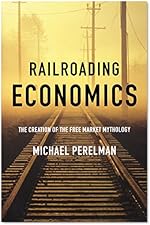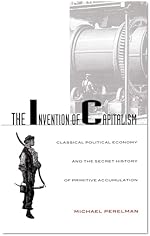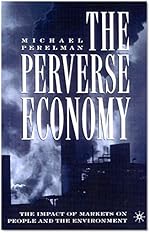My Intellectual Biography
 Although I earned a degree in agricultural economics from the University of California, Berkeley in 1971, I never could bring myself to accept the ideological framework of conventional economics. Early on I noticed that the agricultural system was consuming ten times more energy than it was producing in the form of edible food. I looked more deeply into the environmental, social, and economic costs of the current agricultural system. These investigations finally led to my first book, Farming for Profit in a Hungry World (1977). In this book, I showed how the profit-oriented agricultural system created hunger, pollution, serious public health consequences, and environmental disruption, while throwing millions of people off the land.
Although I earned a degree in agricultural economics from the University of California, Berkeley in 1971, I never could bring myself to accept the ideological framework of conventional economics. Early on I noticed that the agricultural system was consuming ten times more energy than it was producing in the form of edible food. I looked more deeply into the environmental, social, and economic costs of the current agricultural system. These investigations finally led to my first book, Farming for Profit in a Hungry World (1977). In this book, I showed how the profit-oriented agricultural system created hunger, pollution, serious public health consequences, and environmental disruption, while throwing millions of people off the land.
I also had a strong interest in the history of economic thought, which led me to look into the historical evolution of the agricultural system through the lens of the major representatives of classical political economy. These economists, who wrote during a period that ranged from the late 17th century through the middle of the 19th century, lavished praise on free and unfettered markets in their theoretical works. In their more policy-oriented writings — letters, diaries, and more policy-oriented works — they promoted the active use of the state to apply extra-market forces in the interest of capitalists to the detriment of others. In particular, I looked at the fairly universal call of these political economists to undermine relatively self-sufficient small farmers to transform them into wage workers. This study led me to write Classical Political Economy, Primitive Accumulation and the Social Division of Labor (1983).
A central theme of this book was the creation of a social division of labor — the partitioning of the economy into separate commodity producing units. I then began to look at what light Karl Marx could throw upon this subject. Reading Marx in this light made me realize that most of his readers missed what I considered to be very important to understanding his work. These researches led to my book, Karl Marx’s Crises Theories: Labor, Scarcity and Fictitious Capital (1987). I found that Marx sometimes wrote in order to influence contemporary political conditions. This aspect of his work led him write in such a way that seemed mislead later readers. Failing to see that element of Marx’s work, modern readers generally are inclined to read his writings as if they were timeless truths. For example, his famous articles on India argued that England was promoting progress in India, but Marx knew little about India at the time. Instead, he was trying to undercut the influence of Henry Carey at the New York Tribune, where Marx also wrote. I also found that scarcity was important to Marx, but he obscured this aspect of his work within the category of the organic composition of capital. Within this perspective, Marx’s crisis theory was far more sophisticated than many modern readers had realized. For Marx, subjective valuations caused market prices to violently oscillate. As investors became more optimistic, prices would rise in an irregular fashion, preventing prices from guiding the economy in an appropriate manner. Crises were required in order to set the economy right again, although the violence of the cure would eventually cause the system to collapse.
My study of Marx’s work on constant capital brought me back to my work in graduate school where I was concerned with the irrationality of investment in long-lived capital goods. Since a durable capital good is an investment that only pays of in the future and since the future is unknown, rationality in investment can only occur by accident. Thinking about markets in this light led me to turn to John Maynard Keynes. I found that while Keynes was interested in investment in capital goods, he entirely overlooked the decision to replace obsolete capital goods. The result of this research was Keynes, Investment Theory and the Economic Slowdown: The Role of Replacement Investment and q-Ratios” (1989). This book showed that the neglect of replacement investment caused a serious misreading of Keynes’ work.
One consequence of this study was that I realized that crises were a necessary component of capitalist economies within the context of Keynes’s analysis, just as was the case within Marx’s. In particular, a strong economy is not conducive to replacement investment. As a result, without crises, an economy would tend to run down as its capital stock ages. In addition, an expanding economy freed from crises would create insufficient incentives for business to become more efficient. In short, efforts to maintain economic health actually cause the enfeeblement of the economy. Capitalism needs crises. These crises, however, can destroy capitalism, since the same crises that cause waves of replacement investment also destroy the value of existing capital. This conclusion is similar to Marx’s crisis theory that I discussed in my Marx book.
My next book, Information, Social Relations, and the Economics of High Technology (1991), was a transitional project. As the title suggests, unlike my earlier studies, which tended to look at traditional sectors of the economy — agriculture and manufacturing — I was becoming interested in the implications of high technology. The main finding of this book is that markets are absolutely inappropriate for handling information. Since markets supposedly set price near to the cost of production of the next additional unit, and since information is almost costless to reproduce, competitive prices of information goods will tend towards zero.
I then returned to the work of the Keynes book, trying to apply it to the postwar U.S. economy in The Pathology of the U.S. Economy: The Costs of a Low Wage System (1993). The main innovation of the book was to show how high wages, like crises, could force firms to become more efficient. The main theme of the book was that capitalism was a conflictive, contradictory system. Any effort to make a market economy run smoothly will in the end only create new problems.
I then decided to take a longer look at the US economy in what became The End of Economics (1996). I realized that I had missed a major consideration in some of my earlier work. The same cost structure that made markets inapplicable to information was approximated in manufacturing and railroads. In other words, the cost of producing or hauling another pound of steel is relatively small. The major expenses in such industries are in the heavy investment in fixed capital. In this investigation, I realized giant corporations had an incentive to enjoy cost savings from introducing new technologies. This strategy would threaten to destroy the values of fixed capital and to create a response from competitors. Typically, these investments increase the scale of production. As output increases, prices collapse toward the cost of producing another unit. The consequence is bankruptcy for the majority of participants.
Just as in the case of the classical political economists discussing the rural sector, the major economists of the last nineteenth century wrote elaborate treatises about the perfection of free markets at the same time that they strongly recommended that the corporations be permitted to create trusts, cartels or monopolies. Indeed, beginning in the late nineteenth century, a great merger wave consolidated industry after industry. Over the next decades, competitive forces weakened until the Great Depression broke out.
I realized that in the US economy trust in the market pulsated. For a period, economic forces would get a free hand until the inevitable crisis occurred, then popular pressure would demand the exercise of control over the market.
Next, I returned to the subject of information and high technology in Class Warfare in the Information Age (1998). This book went into more detail about how markets were inappropriate for handling information. A more fundamental theme was that the information economy would be used for monitoring and control than to provide goods and services that would improve the people’s lives.
Many of the ideas of the previous books came together in The Natural Instability of Markets: Expectations, Increasing Returns and the Collapse of Markets (1999). On a more theoretical level, I tried to show why markets are fundamentally unstable because prices tend to move toward the cost of producing one more unit of output. As I mentioned before, competition in both information and manufacturing businesses cause deflationary pressures that tend toward crisis. I showed that high labor costs as well as high resource costs as a result of regulation both tend to produce offsetting pressures that reduce the tendency toward crisis.
On a deeper level, this book calls the conception of competition into question. I show that intense competition is equivalent to a depression, yet most economists believe that competition is good and depressions are bad. In order to get a better fix on competition, I appealed to Stephen Gould’s vision of biological competition. This argument of book is more complex and almost impossible for me to sum up in a couple of paragraphs. In short, it was probably favorite book up until that date.
My next project was Transcending the Economy: On the Potential of Passionate Labor and the Wastes of the Market (2000). This book is very different from anything else that I attempted. The underlying proposition is that the current economic system has so many wastes that moving to another sort of economy does not present much of a risk. The first part of the book explores the many huge wastes in the economy today. The second part explores the potential of passionate labor — meaning the sort of feats that people can accomplish when they have the opportunity to work on something that they love.
At the same time, I had been working for almost 15 years on The Invention of Capitalism: The Secret History of Primitive Accumulation. This book began as a simple rewrite of my earlier book on classical political economy, but as time went on the book took on a life of its own. Although the basic idea remained the same, this version was a vast improvement over the earlier one.
Next, I turned to The Pathology of the U.S. Economy Revisited: The Intractable Contradictions of Economic Policy” (2001), which hich began as an update of an earlier book with a similar title. I had not realized the extent to which I had to revise this manuscript because of the dramatic changes in the economy in the course of the 1990s.
I then returned to the question of intellectual property in Steal This Idea: Intellectual Property and The Corporate Confiscation of Creativity (2002), which analyzes the destructive nature of intellectual property. In this book, I describe how corporate powers have erected a rapacious system of intellectual property rights to confiscate the benefits of creativity in science and culture. This system threatens to derail both economic and scientific progress, while disrupting society and threatening personal freedom. The natural outcome of this system is a world of excessive litigation, intrusive violations of privacy, the destruction system of higher education, interference with scientific research, and a lopsided distribution of income.
With The Perverse Economy: The Impact of Markets on People and Nature (2003), I turned to what I call the farm worker paradox — that capitalism treats the people and conditions that are most essential to human life with utter disregard. I integrated this insight with my earlier work on the inefficiency of markets to show what markets are especially incapable of managing resources in a rational way.
At this point, I began work on Manufacturing Discontent: The Trap of Individualism in a Corporate Society (2005). This book enlarged on the way that U.S. version of capitalism runs roughshod over people as workers, consumers, and citizens. I compared the actual functioning of the economy with its ideological underpinnings.
My next project was Railroading Economics: The Creation of the Free Market Mythology (2006), a much improved and updated version of The End of Economics, which Routledge graciously permitted. Monthly Review Press published the book at an affordable price.
From there, I turned to The Confiscation of American Prosperity: From Right-Wing Extremism and Economic Ideology to the Next Great Depression, where I offered a detailed history of how conservative forces managed to turn back the modest gains that people had made since the Great Depression. While this political victory undoubtedly provided short-term gains for business, I devoted much of the book to analyzing why this turn to the right will prove utterly destructive, so much so that it will even harm the immediate beneficiaries. Finally, I discuss why the economics profession has been incapable of dealing with the disastrous consequences of the right wing revolution.
My latest project is The Invisible Handcuffs of Capitalism: How Market Tyranny Stifles the Economy by Stunting Workers. Monthly Review Press will publish it. The book has two basic themes. The first is that the way that capitalism is structured makes it incapable of efficiently managing the labor process and that capitalism’s efforts to control the labor process create serious social and economic damage. The second theme is that economics emphasizes transactions while mostly excluding the productive side of the economy, especially matters of work, workers, and working conditions. The effect of this neglect of the production side of the economy is much of economic theory becomes trivialized.
I have also begun working on a new book, Sex, Lies, and Economics: The Amazing Story of Economics and Economists before Adam Smith.
To give you a flavor of the book, here are the first lines of the Introduction and the first chapter:
Besides describing some of the brilliant accomplishments of the colorful founders of economics, this book will also discuss their dark side, including a few murders, over and above crimes more commonly associated with economists. At the same time, these economists’ lives and work will throw light on both contemporary economics and economies.
These economists, besides strongly influencing much of future economic thinking, mostly wrote to further their careers personal interests: either trying to explain away what seemed to be illegal activities or to prove their usefulness to powerful people. This combination of theoretical and personal interests merged with another goal of early (and later) economics: how to get as many as possible people (of a certain class) to work as long and as hard as possible. In this sense, their bodies of work were intended to shape the lives of other people, whom they and their compatriots regarded as little more than physical bodies of work.
<snip>
Before discussing the work and life of William Petty (1623-1687), it might be of interest to note that he has the unique distinction of being the only economist in history credited with having brought a person back from the dead. We will get back to that feat later.
7 comments so far
Comments are closed.

 25 – The Confiscation of American Prosperity: From Right-Wing Extremism and Economic Ideology to the Next Great Depression
25 – The Confiscation of American Prosperity: From Right-Wing Extremism and Economic Ideology to the Next Great Depression 30 – Manufacturing Discontent: The Trap of Individualism in Corporate Society
30 – Manufacturing Discontent: The Trap of Individualism in Corporate Society Class Warfare in the Information Age
Class Warfare in the Information Age Railroading Economics: The Creation of the Free Market Mythology
Railroading Economics: The Creation of the Free Market Mythology Steal This Idea: Intellectual Property Rights and the Corporate Confiscation of Creativity
Steal This Idea: Intellectual Property Rights and the Corporate Confiscation of Creativity The Invention of Capitalism: Classical Political Economy and the Secret History of Primitive Accumulation
The Invention of Capitalism: Classical Political Economy and the Secret History of Primitive Accumulation The Perverse Economy: The Impact of Markets on People and the Environment
The Perverse Economy: The Impact of Markets on People and the Environment
[…] system to replace it: Dean Baker, co-director of the Centre for Economic Policy and Research, and Michael Perelman, professor of economics at California State University, […]
[…] of democracy. The courageous people in the streets today deserve whatever support we can offer. Michael Perelman’s latest book: The Invisible Handcuffs of Capitalism: How Market Tyranny Stifles the Economy by […]
[…] of democracy. The courageous people in the streets today deserve whatever support we can offer. Michael Perelman’s latest book: The Invisible Handcuffs of Capitalism: How Market Tyranny Stifles the Economy by […]
[…] that should remain up for the foreseeable future given WordPress.com’s permanence, especially the intellectual biography in which Michael describes the road he […]
[…] My intellectual biography – which tells you what he thought about his […]
[…] My intellectual biography – which tells you what he thought about his […]
[…] My intellectual biography – which tells you what he thought about his […]